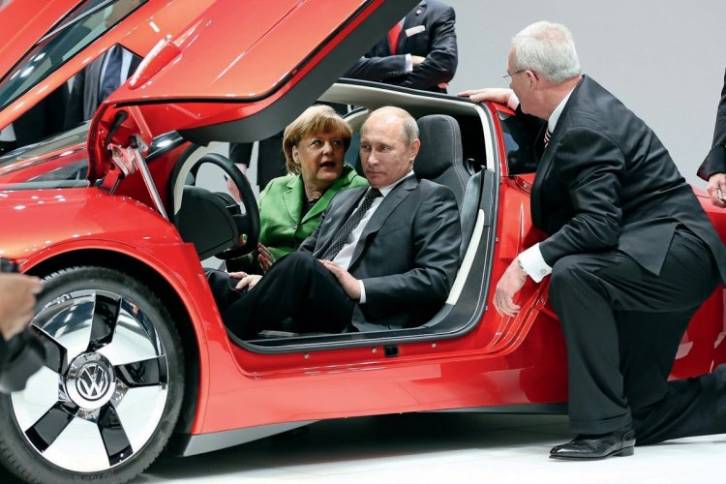More German investments are now being made in Russia than before anti Russian sanctions were imposed in 2014. 1.7bn Euros were invested by German industry in the first three months of 2019 with the total up 33% over last year (which was already a record year since 2008). Trade between the two countries increased last year by 8.4% to 62bn Euros.
https://russia-insider.com/en/more-german-capital-now-flowing-russia-sanctions/ri27452?ct=t(Russia_Insider_Daily_Headlines11_21_2014)&mc_cid=14fa759fb6&mc_eid=072b05302a
In a recent Freenations post we showed how EU business has been cooperating with Russia behind our backs and badmouthing Britain and British business. It was a characteristic of the absurd May regime that her Russophobic bigotry and EU yellow star-tinted spectacles even led the British government to ignore the Russian opposition to such anti British activities.
Siemens’ Chief Executive in Russia has said that the company’s 2000E turbine with a 187MW capacity (with dual civil and military uses) is now 60% built in Russia. A Russian friend has told me that a retired military officer of his acquaintance said that “one day Germans will do with the Americans what they have done with soviet bases in East Germany” (ie remove them). He also reports the words of the CEO of a French company in Moscow “let the US and UK be hostage to their own sanctions”. The tale of the failure of those sanctions is the main thrust of this article.
Germany has ironically profited from the sanctions it is largely ignoring – at least in terms of long term investments. Since the sanctions were imposed in 2014 the Ruble has fallen by 60% against the Euro meaning that Germany can buy up Russian assets at rock bottom prices. German industry did the same thing as the Euro devastated the economies of Mediterranean and some East European countries, suppressing asset values and making purchases and investment very cheap.
RUSSIA SANCTIONS A FAILURE
Russian gold and foreign currency reserves have reached $500bn in June (with only one fifth of that held in actual dollars) and stand near to the pre sanctions high.
Despite low oil prices Russia continues to run a massive trade surplus of about $19bn per month and is increasingly not dependent on oil. Russia also manages to run a $11bn surplus with China! Russia and Japan are approaching a resolution of the territorial conflict on offshore islands not least because, as the UK and USA object to Russian gas coming to Europe, the Japanese want as much as they can get!
Russian total external debt is the lowest for 10 years and Moody’s has upgraded its debt rating, saying that:
“The upgrade of Russia’s ratings reflects the positive impact of policies enacted in recent years to strengthen Russia’s already robust public finance and external metrics and reduce the country’s vulnerability to external shocks including fresh sanctions,”
Bloomberg ranks Russia 2nd among 21 “emerging market” economies.
When you attack, with trade sanctions, a country as large as Russia, with massive oil and gas reserves, gold and other minerals, a climate which can grow anything somewhere in its varied terrain from the Black Sea to the Pacific to the Arctic and has a history of innovation in space and military technology – then you will fail. Instead you increase its independence, fortify its defences, heighten its technological creativity and make it unlikely it will return to its traditional suppliers in the West.
The effect on the Western economies of anti Russian sanctions has been considerable with German and French industry and EU agriculture suffering badly. In particular the Baltic states, prior to sanctions, experienced a boom as Russian oil, coal, chemicals and household goods went through Lithuania, Latvia and Estonia boosting their growth rates to about 10% pa. Anti Russian sanctions and Russia’s retaliation put an end to that.
What EU countries have lost, Russian business and agriculture have harvested! Russia, having been a big importer, is now exporting more food than ever. Grain production is now at 170% of its own consumption, sugar at 105%, vegetable oil at 153% and for meat and meat products 93% – with the power to produce far more and possibly become a net exporter even in that market. Russian defence equipment manufacture has grown as sanctions have restricted imports. Russia is unlikely to trust foreign suppliers again and once domestic manufacturing and food and grain production infrastructure has been established future imports from those who do not wish Russia well become less necessary and less wise.
Sanctions have even helped Vladimir Putin in his perennial conflict with Russian oligarchs who have been forced by sanctions to repatriate their tax avoiding assets from offshore!
And within the West, USA-driven sanctions have cost the American economy little – compared to the estimated $44bn losses for the German economy. Total EU losses have been estimated at 100bn Euros! Such tensions within NATO are just what Russia will see as a benefit!
No wonder that in May this year the St Petersburg International Economic Forum boasted 15,000 participants from over 100 countries! Needless to say France’s Macron was among those present (not that the Russians have much respect for him) while the British Government, so badly in need of friends and markets after Brexit, could not be bothered.
We can only hope that Boris Johnson’s Government will not be so foolish. There are plenty of others called Boris willing to make friends!


















